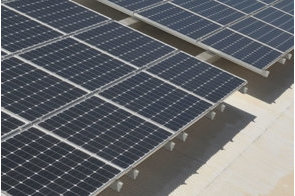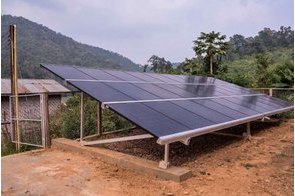How renewables are electrifying Nigeria’s future

Summary
Nigeria needs to tap into its high potential for renewable energy generation to satisfy the country’s needs.
Nigeria currently produces only a fraction of the electricity its growing population needs. How can renewables be part of the calculation?
Nigeria is the six-largest oil producing nation in the world, but it also has abundant renewable energy resources in the form of wind, hydro, and tidal power. Nevertheless, the country has serious energy deficiencies which are likely to increase as the population grows.
Although data from the Energy Information Administration (EIA) shows that Nigeria has improved its energy generation in recent years, the country still lags behind peer economies such as Brazil, India and South Africa in meeting current energy needs, much less building for future growth.
“Nigeria is a country waiting to happen,” says Udemgba Samuel Onuoha, business hub manager at Ibadan Electricity Distribution Company, the main electricity provider in Ibadan, Nigeria’s third-largest city. “Only by meeting the energy needs of the people can the economic and developmental needs of the country be fulfilled.”
Nigeria currently has the capability within existing power plants to generate 12,522 MW of electricity daily, but most days is only able to generate around 4,000 MW due to a variety of factors, including an inefficient transmission network, weak government policy, and inadequate energy reforms.
Investing in renewables
In Onuoha’s opinion, it is critical that Nigeria taps into its high potential for renewable energy generation to satisfy the country’s needs.
“In Nigeria, petroleum accounts for 80% of the energy supply, with one of the lowest per-capita energy consumption rates in the world and a fast-growing population,” Onuoha says.
Wale Yusuff, Managing Director of Wärtsilä Nigeria, shares this perspective with Onuoha.
“Nigeria will only achieve its target of generating 11,000 MW daily by 2023 if the government invests in renewable energy,” Yusuff says.
According to Yusuff, a 30% share of renewable energy as well as a sizable share of thermal base power as envisioned in the Nigeria Electrification Roadmap is a robust and appropriate mix for the country at this point.
He emphasises that Nigeria has abundant natural gas resources that have yet to be fully tapped and suggests the development of a large fleet of medium-size gas-to-power plants as a way forward.
Ultimately, Yusuff says, “the solution is to use utility-scale solar power plants integrated with engine power plants and energy storage.”
Cooperation to find solutions
Onuoha says that the challenge of developing Nigeria's vast, untapped energy sources requires both public and private action. He says the government is responsible for creating a business-friendly environment through polices and laws to attract investors to the sector while also partnering with such investors, if need be, to set up targeted energy development projects.
The size of the gap between energy production and demand is a critical indicator of the vast potential and money that can be made from this sector.
The failure of the country to adequately tackle its energy challenges has led to a thriving black market in energy generation. Nigeria is the world’s largest black market for electric generators with over one hundred million generators in private hands. Many Nigerians pay for fuel to run private generators as well as high electric bills to local utility companies.
In addition to encouraging capital flight, the purchase of these generators also promotes the use of crude oil at a time when the country should be developing its renewable sector. But the government will have to act to make renewables a part of filling that gap. In addition to creating a favourable regulatory environment, the government should as a matter of policy also substantially build up its local technical capacity from its international partnerships with likeminded business organizations.
Wärtsilä offers a way forward, according to Yusuff. He notes the proposals made in a recent white paper showing the way towards a 100% renewable future. The paper emphasises the importance of incorporating a credible renewable base load strategy in order to eventually reach a fully green energy mix.
Yusuff pointed out that any serious, long-term energy strategy must embrace a number of key trends, including the rapidly increasing penetration of renewables, decentralizing energy generation, increasing the role of flexible power plants that incorporate gas and emerging storage technology, along with the latest in data and digitisation.
If Nigeria can manage to create an economically viable and thriving renewable industry, the investment will benefit more than just the energy sector. The availability of reliable electricity has the potential to transform the country’s economy and improve the lives of millions by encouraging entrepreneurship and small business growth. These new businesses will produce revenue that the government in turn can invest back into maintaining and upgrading the energy infrastructure.
Wärtsilä is a nearly 200 years old international energy company. It has delivered power plants in 47 out of 54 African countries and is one of the major energy companies in Nigeria.
Related
-
Finnfund invests $20m in fund for clean energy, climate mitigation in Africa
Evolution III closed at $199.4 million in conditional commitments from seven international investors, including several ...
-
GreenWish Partners to invest $280 million to build solar plants in Nigeria
The company said it will build a 100 MW plant in Enugu and two 50 MW plants in Kaduna and Jigawa.
-
Renewable energy jobs reach 12 million globally
In Sub-Saharan Africa, solar jobs are expanding in diverse countries like Nigeria, Togo, and South Africa.







